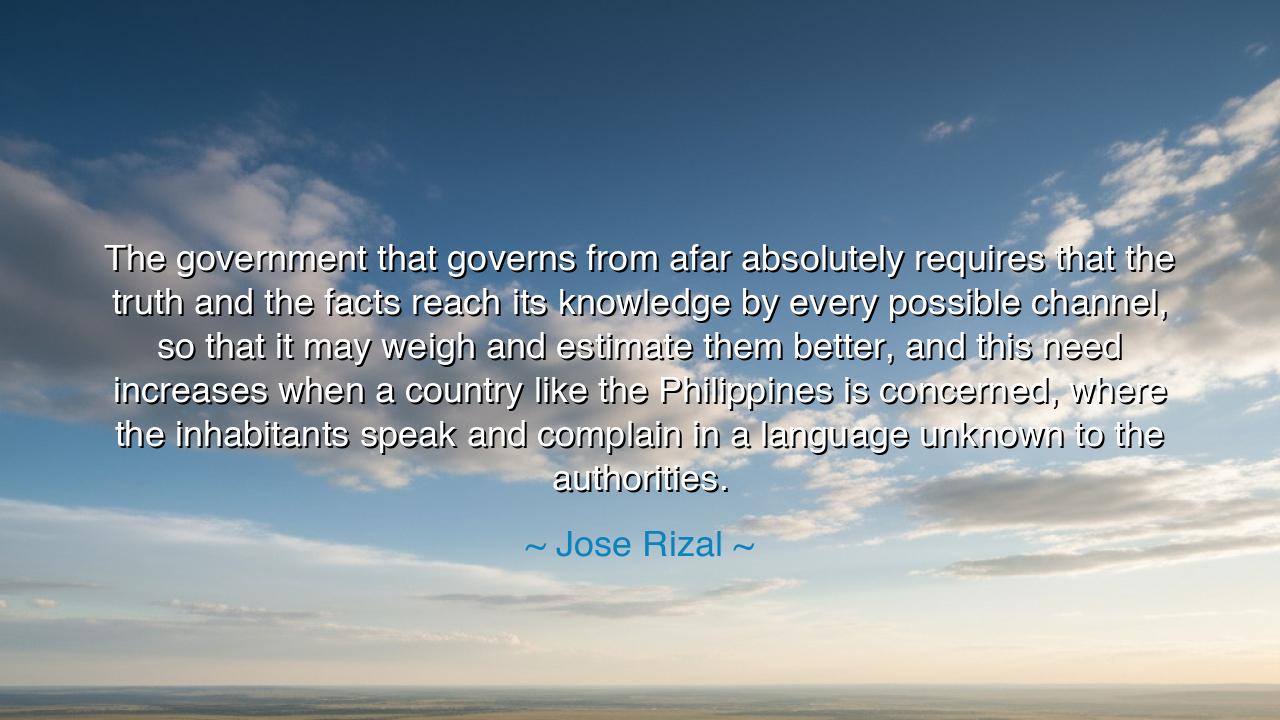
The government that governs from afar absolutely requires that
The government that governs from afar absolutely requires that the truth and the facts reach its knowledge by every possible channel, so that it may weigh and estimate them better, and this need increases when a country like the Philippines is concerned, where the inhabitants speak and complain in a language unknown to the authorities.






José Rizal, the great soul of the Philippines, spoke with prophetic clarity: “The government that governs from afar absolutely requires that the truth and the facts reach its knowledge by every possible channel, so that it may weigh and estimate them better, and this need increases when a country like the Philippines is concerned, where the inhabitants speak and complain in a language unknown to the authorities.” These words burn with wisdom born of suffering, for Rizal knew firsthand the chains of foreign rule and the blindness of rulers who govern without hearing the cry of the governed. His teaching is this: no authority can be just, no empire can endure, if it rules without truth, if it ignores the voices of its people, or if it allows language and distance to become walls that hide reality.
In the days of Rizal, the Philippines groaned under the weight of Spanish dominion. The rulers sat across the seas, distant in both miles and understanding. They held power, yet they did not hear the heartbeat of the islands, for the language of the people was strange to their ears. Complaints rose like smoke, but to the rulers, it was but a foreign murmur. Rizal saw this danger with the eyes of both a son of the land and a student of history: a government cut off from the truth of its people becomes not a shepherd but a blind tyrant, stumbling toward its own downfall.
History itself offers countless mirrors of this truth. Consider the fall of the Roman Empire. When its rulers grew distant, when they no longer listened to the cries of the provinces, when their wealth and voices were centered only in Rome, corruption spread and discontent festered. Soldiers, peasants, and conquered peoples alike felt unheard, and the empire crumbled from within. Empires fall not because of enemies at the gates alone, but because they lose the truth of what their own people suffer and need.
Rizal’s words also carry a deeper warning: when rulers and the ruled are divided by language, oppression deepens. For to be unheard is a wound, but to be unheard because your words cannot even be understood is a wound salted with humiliation. The colonizers could not hear the full cries of the Filipinos, for they did not know their tongue. And in this, Rizal teaches that understanding is not merely political but human. A true government must labor to know the heart and language of its people, else it rules only shadows, not souls.
Yet these words are not only for kings and empires long gone. They are a torch for every age. In our time too, leaders must guard against ruling from afar—not only in distance of place, but in distance of spirit. If those who govern do not hear the poor, the worker, the marginalized, then they repeat the blindness of colonizers. If voices are dismissed because they are spoken in unfamiliar languages or forms, injustice festers still. To govern rightly, one must seek the truth through every channel: through listening, through humility, through learning the language of those who suffer.
The lesson is clear: a nation’s strength lies not in the power of its rulers but in the bond between ruler and people, forged by truth, sustained by understanding. Leaders must not only speak but listen; not only command but learn. The people too must not remain silent; they must find channels, through pen, voice, and unity, to carry their truth to those who govern. Rizal himself gave his life as testimony to this: through his writings, he became a channel of truth, opening the eyes of both Filipinos and the world to the injustice in his land.
Practical action lies within reach of us all. Let citizens learn to speak boldly, to record and share the facts, to refuse silence in the face of injustice. Let leaders seek not only reports polished with flattery but the unvarnished truth, however painful. Let communities preserve their languages and demand that they be recognized, for to speak one’s tongue freely is to live in dignity. In every home, in every school, in every council, let us raise truth as the highest standard, for without it, no government can weigh justly, and no future can be secure.
Thus Rizal’s words, though born in the struggle of the Philippines, speak to the world and to all generations: distance without truth is blindness, power without listening is tyranny, and governance without understanding is ruin. Let us, therefore, walk as he taught—carrying truth through every channel, bridging every language, until rulers and people alike are bound not by ignorance but by justice, not by silence but by shared humanity.






AAdministratorAdministrator
Welcome, honored guests. Please leave a comment, we will respond soon